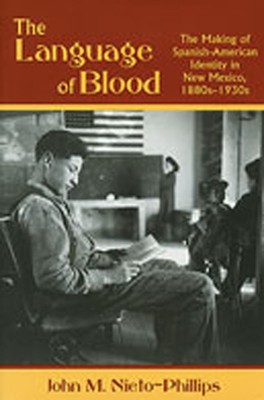
- We will send in 10–14 business days.
- Author: John M Nieto-Phillips
- Publisher: University of New Mexico Press
- ISBN-10: 082632424X
- ISBN-13: 9780826324245
- Format: 15.7 x 22.6 x 2.4 cm, softcover
- Language: English
- SAVE -10% with code: EXTRA
Reviews
Description
When the United States declared war on Spain in 1898, rumors abounded throughout the nation that the Spanish-speaking population of New Mexico secretly sympathized with the enemy. At the end of the war, The New York Times warned that New Mexico's "Mexicans professed a deep hostility to American ideas and American policies." As long as Spanish remained the primary language of public instruction, the Times admonished, "the majority of the inhabitants will remain 'Mexican' and retain a pseudo-allegiance [to Spain]."
This perception of Spanish-speaking New Mexicans as "un-American" was widely shared. Such allegations of disloyalty, coupled with the prevalent views that all Mexican peoples were racially non-white and "unfit" to assume the rights and responsibilities of full citizenship, inspired powerful reactions among the Spanish-speaking people of New Mexico. Most sought to distinguish themselves from Mexican immigrants by emphasizing their "Spanish" roots. Tourism, too, began to foster the myth that nuevomexicanos were culturally and racially Spanish. Since the 1950s, historians, sociologists, and anthropologists have dismissed the ubiquitous Spanish heritage claimed by many New Mexicans.
John M. Nieto-Phillips, himself a nuevomexicano, argues that Spanish-American identity evolved out of a medieval rhetoric about blood purity, or limpieza de sangre, as well as a modern longing to enter the United States's white body politic.
EXTRA 10 % discount with code: EXTRA
The promotion ends in 19d.03:27:40
The discount code is valid when purchasing from 10 €. Discounts do not stack.
- Author: John M Nieto-Phillips
- Publisher: University of New Mexico Press
- ISBN-10: 082632424X
- ISBN-13: 9780826324245
- Format: 15.7 x 22.6 x 2.4 cm, softcover
- Language: English English
When the United States declared war on Spain in 1898, rumors abounded throughout the nation that the Spanish-speaking population of New Mexico secretly sympathized with the enemy. At the end of the war, The New York Times warned that New Mexico's "Mexicans professed a deep hostility to American ideas and American policies." As long as Spanish remained the primary language of public instruction, the Times admonished, "the majority of the inhabitants will remain 'Mexican' and retain a pseudo-allegiance [to Spain]."
This perception of Spanish-speaking New Mexicans as "un-American" was widely shared. Such allegations of disloyalty, coupled with the prevalent views that all Mexican peoples were racially non-white and "unfit" to assume the rights and responsibilities of full citizenship, inspired powerful reactions among the Spanish-speaking people of New Mexico. Most sought to distinguish themselves from Mexican immigrants by emphasizing their "Spanish" roots. Tourism, too, began to foster the myth that nuevomexicanos were culturally and racially Spanish. Since the 1950s, historians, sociologists, and anthropologists have dismissed the ubiquitous Spanish heritage claimed by many New Mexicans.
John M. Nieto-Phillips, himself a nuevomexicano, argues that Spanish-American identity evolved out of a medieval rhetoric about blood purity, or limpieza de sangre, as well as a modern longing to enter the United States's white body politic.


Reviews